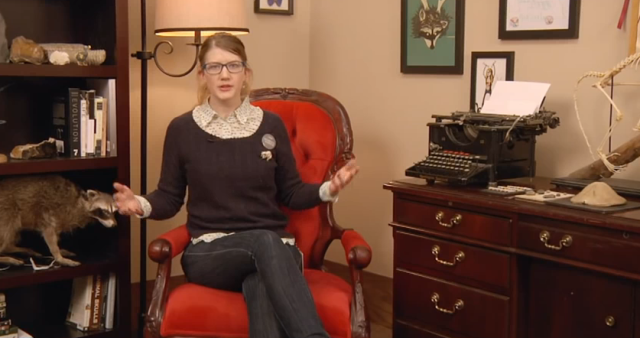screenshot: emily graslie’s response to sexist youtube comments goes viral

Image: YouTube/The Brain Scoop
Emily Graslie, the creative mind behind popular YouTube science channel The Brain Scoop, has spoken out against the daily barricade of sexist comments she receives in a video in which she asks why there are so few popular female STEM (science, technology, engineering and math) creators on YouTube.
In the video, which has done the rounds on Facebook and Twitter, Graslie keenly articulates the prominence of internet bullying and the lack of STEM ladies on YouTube. At least 13 male-hosted STEM channels have attracted more than 400,000 subscribers and over half have surpassed the 1 million mark, but less than five STEM channels with more than 160,000 subscribers are hosted by women, and none have hit 1 million. Graslie herself has 179,000 and The Brain Scoop is considered one of the most successful channels for good reason. Hers is a warm and engaging account of science – and right now she’s the ‘Chief Curiosity Correspondent’ at Chicago’s Field Museum.
Setting aside her usual science fare, Graslie addresses the sexism she is subjected to in her new video ‘Where My Ladies At?’. Along with director and video editor Michael Aranda, the host of The Brain Scoop dissects a selection of sexist messages from her inbox — each with little variation in their condescending tone, rampant gender stereotyping and demeaning attitudes towards women in science. The messages include such gems as ‘You’d think this was a man’s job, not two beautiful ladies. Thumbs up for the Skyrim reference, it made me chortle. I assume that was written by Michael.’ [Michael: ‘That was not written by me.’] Real nice.
The grievances her commenters air have little to do with science. Instead it’s about Graslie’s body, how she dresses and how she looks, with comments like, ‘I can’t stop looking at her nose. It looks so weird. It kind of makes her look like a nerdy pig.’ That she’s a science reporter who happens to be a woman is what the comments focus on, with the science at The Brain Scoop’s centre taking second stage, much to Graslie’s disappointment.
It’s a message that needs sharing. Too often we’re encouraged to ignore the keyboard warriors – don’t feed the trolls etc. – but simply brushing off the (in most cases idiotic) criticism without comment is a passive response to online bullying. More than that, it’s a way to condone the behaviour because it’s more acceptable than hurtling abuse at a street performer. Under the cloak of anonymity a comparatively normal person can morph into an ugly troll, all because living without consequences is a deeply alluring prospect.
Like any good reporter, Graslie asks two pertinent questions: why are there so few female STEM creators on YouTube and why aren’t they recognised in the same way as their male counterparts? Her hypothesis is that many faceless commenters, who reduce her skill set to pretty, write off her channel as irrelevant or sub-par on the basis of her gender. Or, they only watch it to critique her physical appearance.
‘[Female STEM creators on YouTube] have a fear of the feedback from our subscribers and commenters because we’re afraid that our audience is more focused on our appearance than the quality of our content. Even more than that, we’re not convinced that the content has to be good or factual because we’re not convinced that people are watching for the content in the first place,’ she says in the video.
Collaborations are also fraught with complications because commenters are fighting for romanticism between Graslie and her guests, like Michael Aranda, which threatens to negate the science behind The Brain Scoop. Far from being an isolated problem, in her video Graslie pointedly looks to her male and female colleagues in science and her YouTube cohort for support in making trolling less condoned and celebrated.
‘I’ve heard from male colleagues and they say that while they certainly don’t support sexism and they think it’s awful, they feel as though they have nothing to contribute to the conversation. But it starts with an acknowledgement from both men and women that these are serious issues that need to be discussed. We can’t idly sit by and tolerate internet bullying in any form. Because that’s what this is. This is internet bullying. Help us make it widely known that this kind of apathetic attitude is detrimental and unacceptable. We need to make sure we’re making it possible for people of all genders to feel acknowledged for their contributions and not feel held back by something as arbitrary as their genetics or appearance,’ Graslie says in her video.
If you haven’t checked it out already, you can view ‘Where My Ladies At?’ below and watch Graslie explain some of the many issues facing female STEM educators like her. Be inspired.

